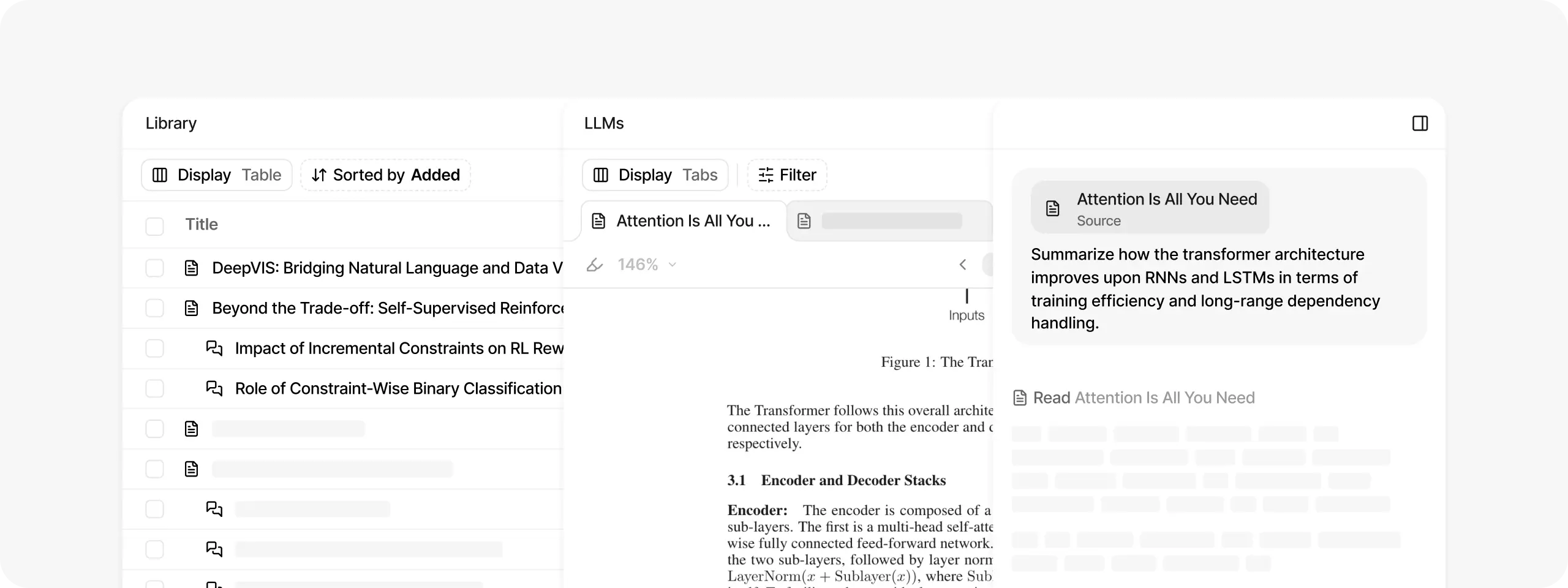AI research paper summarizer you can trust
Keeping up with research is tough and most AI summarizers don’t help. They rephrase abstracts, miss critical details, or worse, fabricate content. You’re left questioning what’s real and what’s not.
What researchers actually need is an AI tool to summarize papers with precision, cite the original source, and let you verify every claim. No hallucinations, no guesswork, just accurate, source-backed summaries.
Here’s an overview of popular research paper summarizers, what they offer, where they fall short, and which ones you can actually trust.
1. Anara
Tired of research paper summarizers that generate text with sketchy or fake citations? Anara is different. It works directly with the documents you upload, ensuring every response is grounded in your actual sources. When you ask about a methodology or key finding, Anara shows you the exact page and paragraph it’s referencing. No guesswork, no invented quotes.
Need to go deeper? Anara can also search the web and academic databases, delivering summaries with the same verifiable, clickable citations that point you straight to the source.
Complex results? No problem. Anara's AI summarizes papers, including those dense sections everyone dreads, and pulls out the insights that matter. Whether it’s methodology notes from page 8, data from Table 3, or limitations buried in the discussion, Anara surfaces it all in context.
It can even summarize research collections and draw connections across papers—perfect for systematic literature reviews or any academic work that demands trustworthy insights.
And the best part? You can explore Anara’s core features for free and see firsthand how it can transform your research workflow.
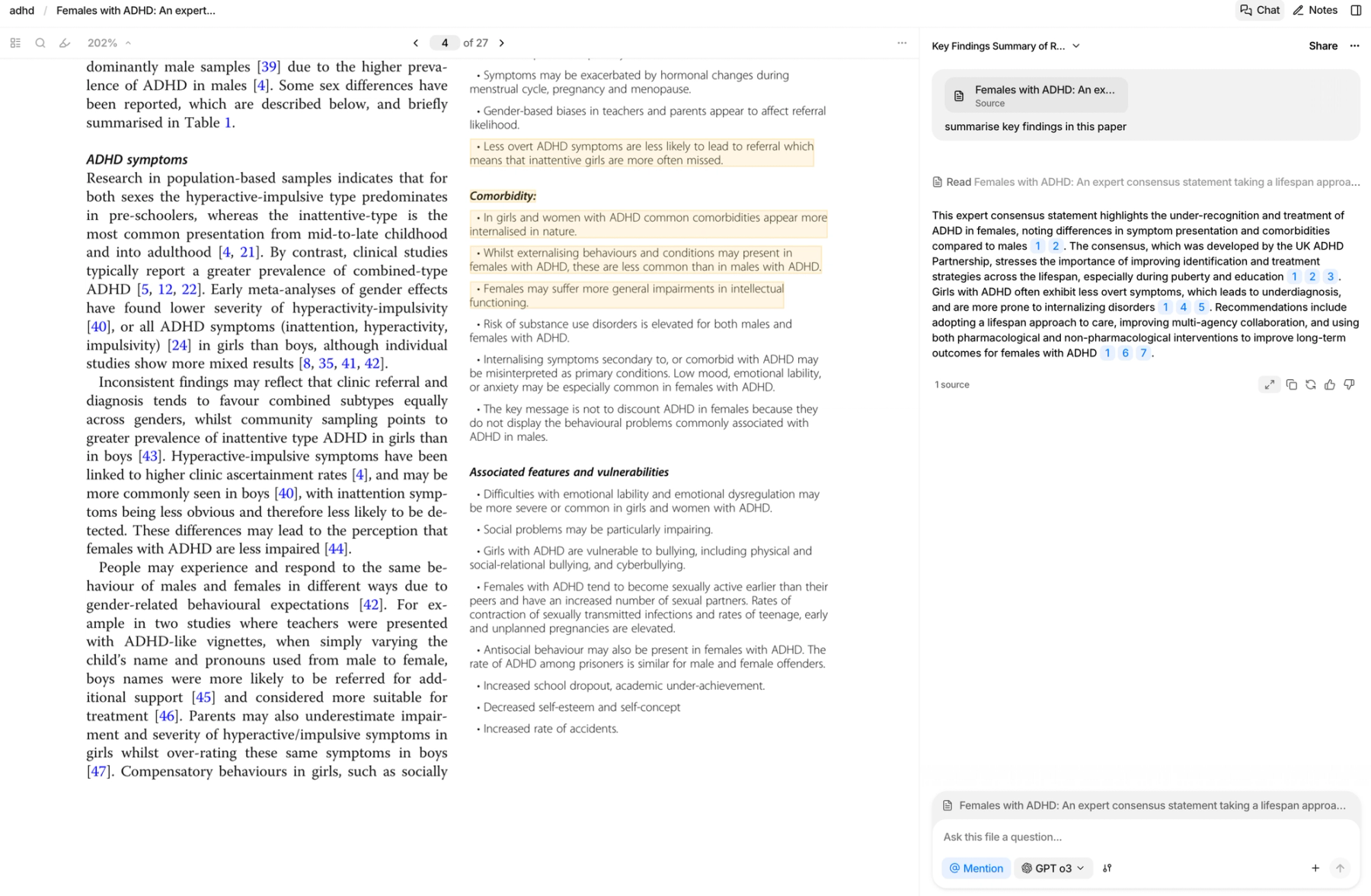
Why do researchers choose Anara's AI to summarize research papers?
- Summarizes insights from diverse research materials—including PDFs, images, audio, and videos.
- Links summaries directly to original sources for easy fact-checking and verification.
- Supports real-time collaboration, letting teams review, comment, and
- interpret documents together.
- Provides powerful internal library search plus web-based research discovery.
- Organizes shared research libraries with files, notes, and findings for comprehensive team projects.
Anara's source highlighting shows me the precise section, so I can understand the context and share accurate information with my team.
A chemistry PhD turned clean tech CTO
Anara pricing
- Free
- Pro: $12/month (annual billing)
- Team: $18/month per user (annual billing)
Get accurate, source-linked research summaries you can trust
Try Anara free2. ChatGPT
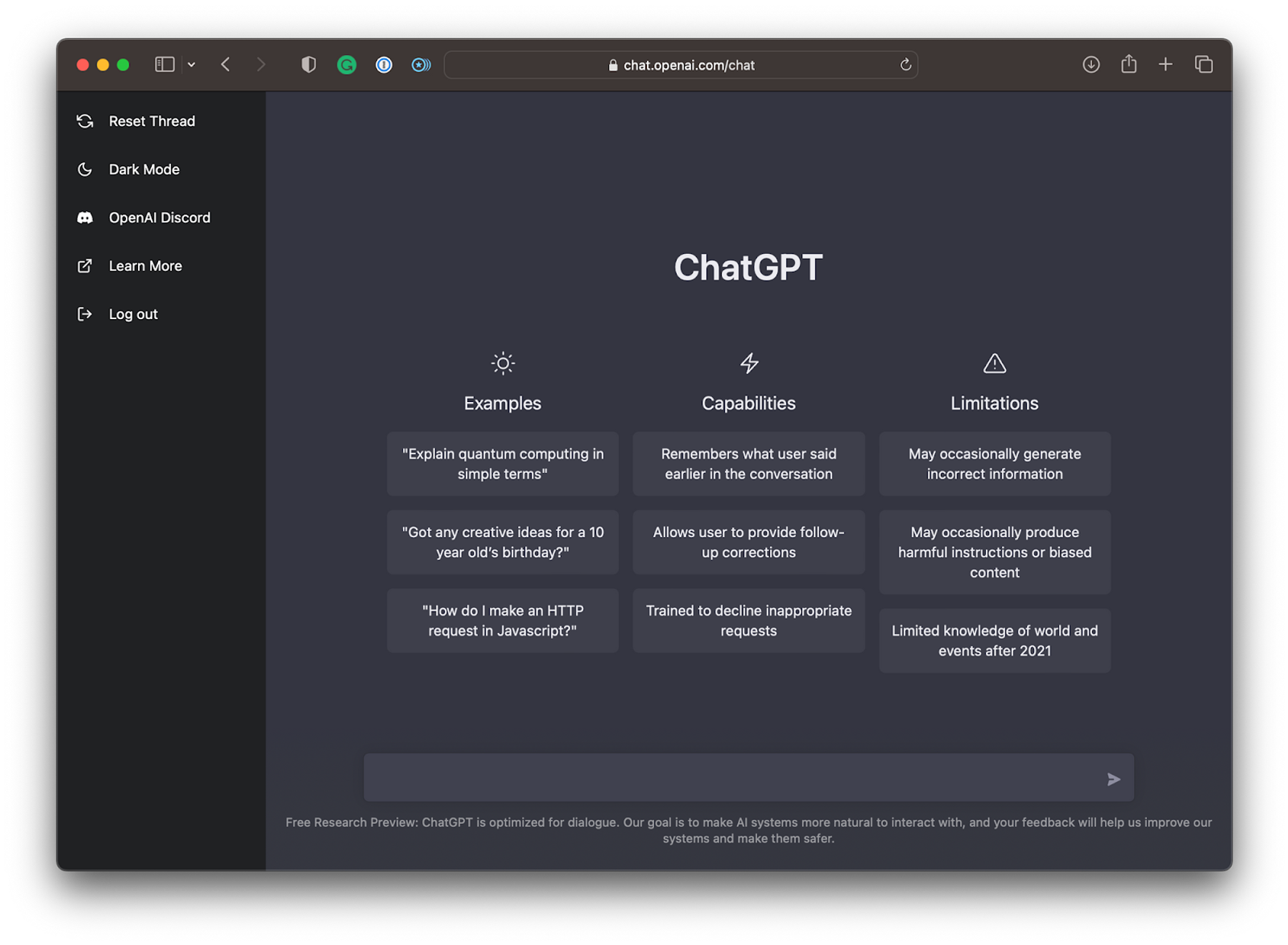
via ChatGPT
ChatGPT has become the go-to free AI to summarise research papers. It can break down complex academic concepts into digestible explanations and spark creative thinking when you’re stuck on research questions.
The trouble starts when you try to summarize entire research papers with it. Those 30-page documents hit ChatGPT’s context limits pretty quickly, forcing you to divide them into pieces and lose important connections between sections. There’s also the citation issue. ChatGPT occasionally invents perfectly plausible-sounding references that don’t exist, rather than admitting it doesn’t know something.
ChatGPT best features
- Brainstorm research questions and develop initial hypotheses for unexplored topics that need creative thinking
- Translate complex academic concepts into plain language for undergraduate students or general audiences
- Explore interdisciplinary connections between fields that might not be immediately obvious
- Draft rough outlines for grant proposals or research presentations that need creative structure
ChatGPT pricing
- Free
- Plus: $20/month
- Pro: $200/month
Related: Anara vs. ChatGPT. What is the difference?
3. Elicit
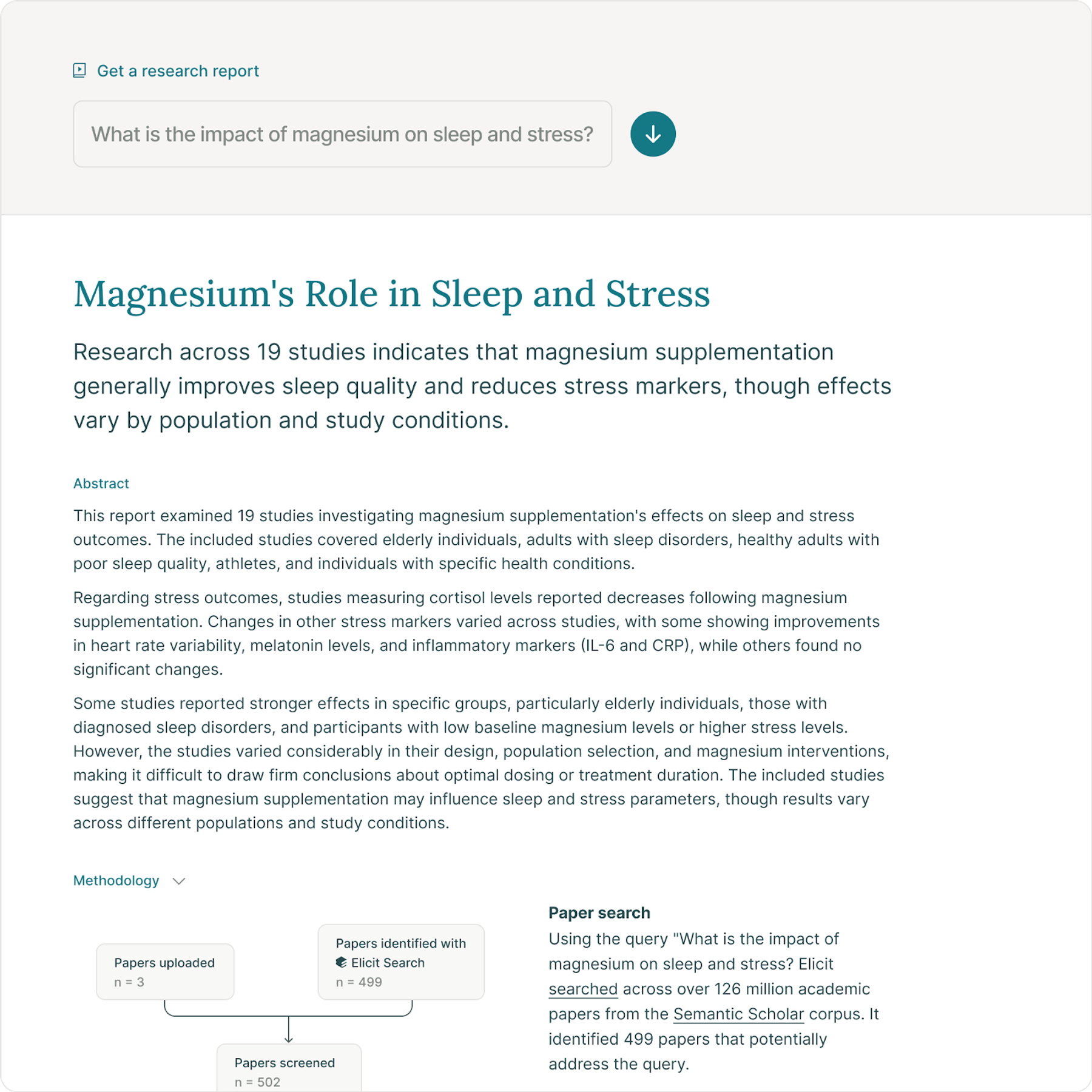
Elicit uses AI to summarize research papers in Google Scholar. You can type in a research question like ‘Does social media affect academic performance?’ and watch it scour academic databases to find relevant studies, then serve up summaries of what it discovered.
It excels in well-established research areas where there’s a wealth of published literature to draw upon. The catch is that Elicit’s power depends entirely on database access so you might hit limited results. Similarly, if you’re working in a brand-new field where there isn’t much published research yet, Elicit might come up empty-handed.
Elicit best features
- Discover relevant papers by entering research questions in natural language rather than using keyword searches
- Build comprehensive literature review matrices that organize studies by methodology, sample size, and key findings
- Track research trends and identify gaps in the literature with AI within specific academic domains
Elicit pricing
- Free
- Plus: $12/month
- Pro: $49/month
- Team: $79/month per user
- Enterprise: Custom pricing
Related: How to use Elicit for literature reviews.
4. ChatPDF
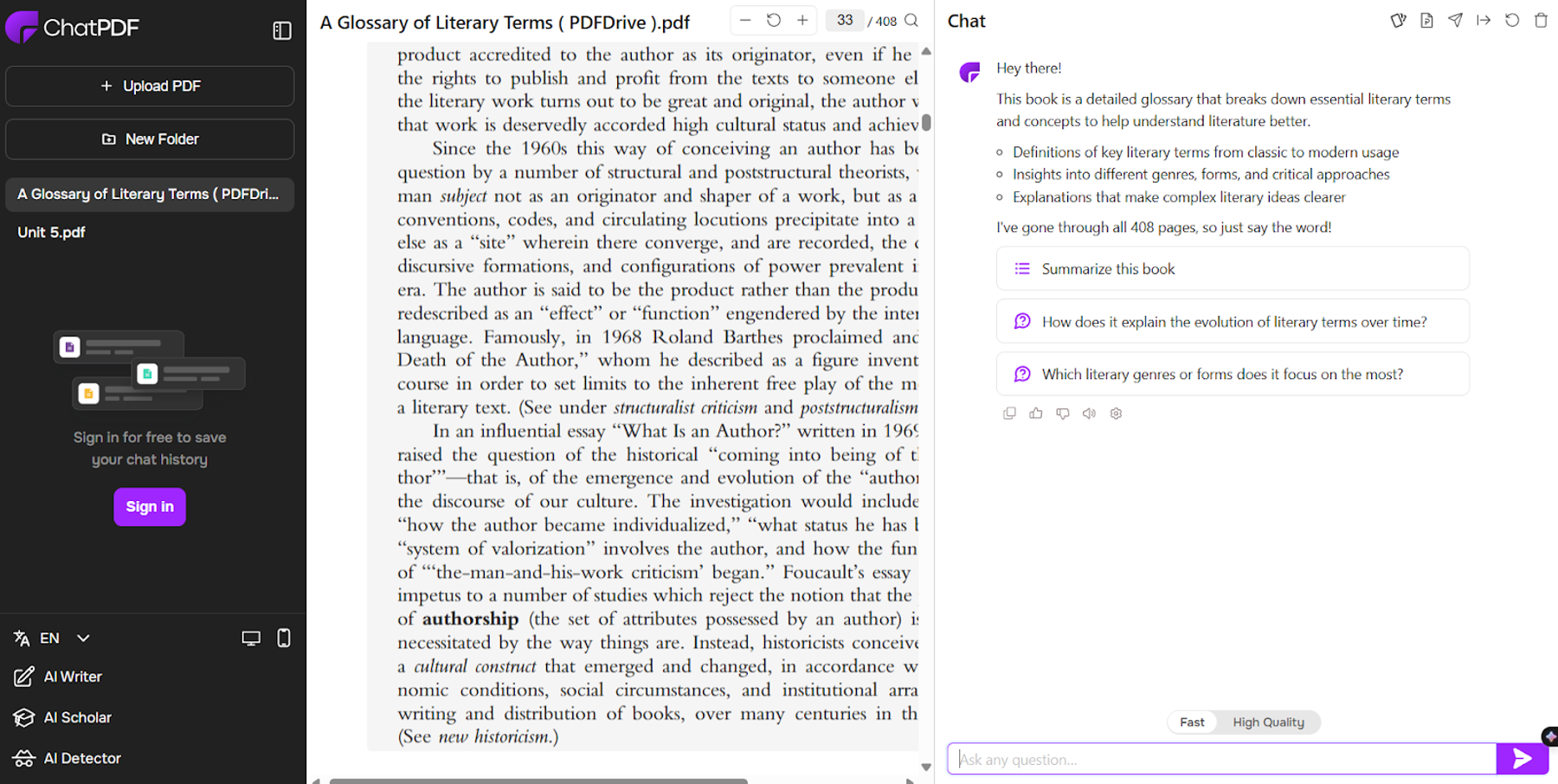
via ChatPDF.com
ChatPDF wins points for being a simple AI research papers summarizer. No account setup, no feature overload, no confusing menus—just drag your PDF onto the page and start asking questions. It can handle straightforward questions about research findings and basic methodology.
ChatPDF has built-in fact-checking features for research summaries, but you might want to verify important details yourself.
ChatPDF best features
- Process documents instantly without creating accounts
- Highlight and extract direct quotes from specific sections
- Receive plain-language explanations of technical concepts that might be unclear in the original academic writing
- Navigate between different sections of lengthy papers using conversational commands rather than manual scrolling
ChatPDF pricing
- Free
5. Scite AI
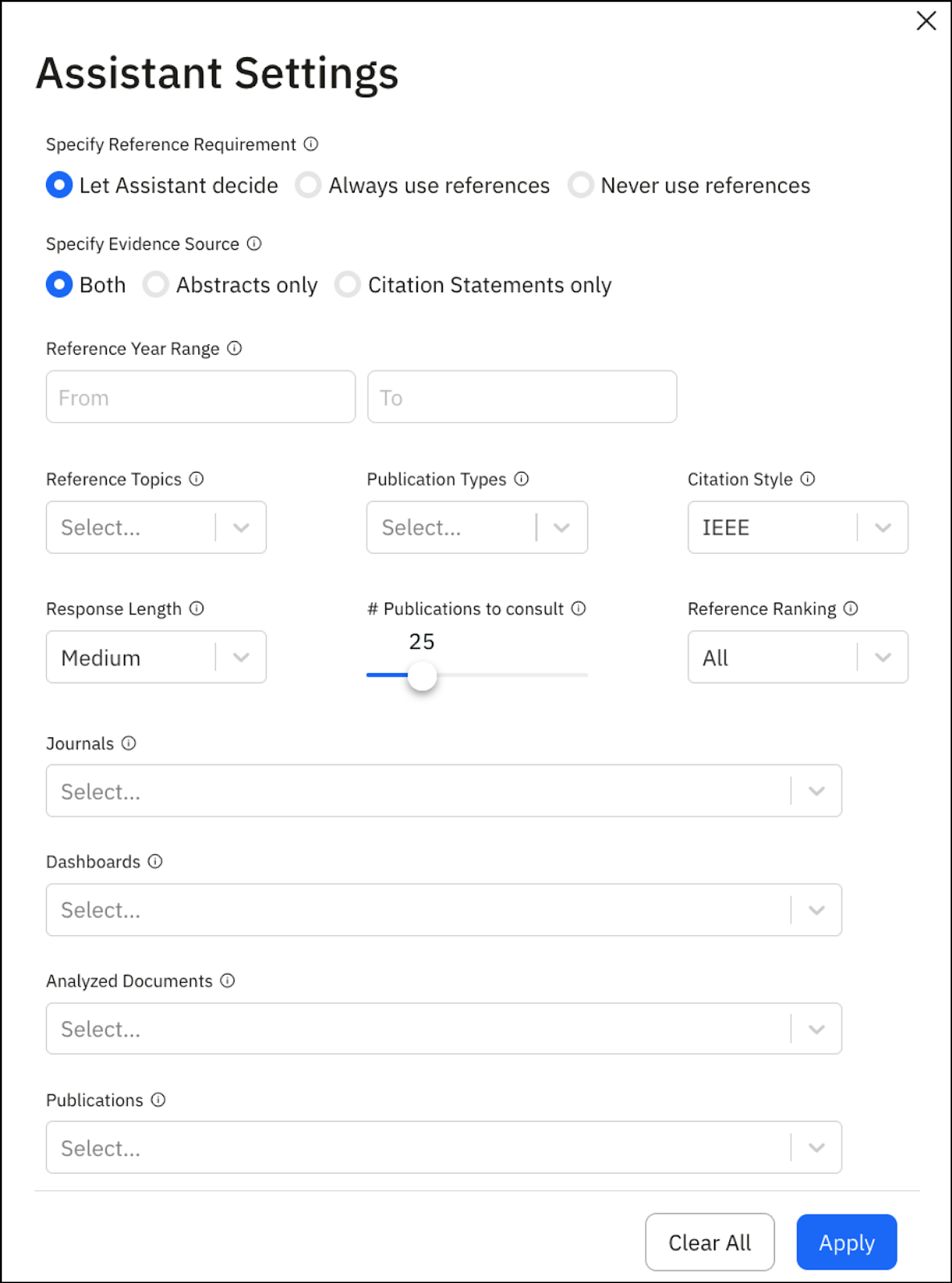
via Scite.ai
Most AI tools for document analysis focus on what papers say, but Scite AI summarizes how other researchers respond to those papers. It analyzes citation patterns and tells you whether subsequent studies supported, contradicted, or simply mentioned the research you're looking at.
Scite AI categorizes citations into different types, so you can see at a glance whether Paper A's methodology was praised, criticized, or ignored by the research community. Researchers usually pair it with other research paper summarization tools to get the whole picture.
Scite AI best features
- Visualize citation networks that show how papers influence each other across time and research domains
- Filter citations by type to focus specifically on studies that contradict or strongly support particular findings
- Monitor citation patterns for your own published work to understand how the research community is responding
- Identify highly debated papers where citation analysis reveals significant disagreement among researchers
Scite AI pricing
- Free trial
- Personal: $20/month
- Organization: Custom pricing
6. SciSpace Copilot
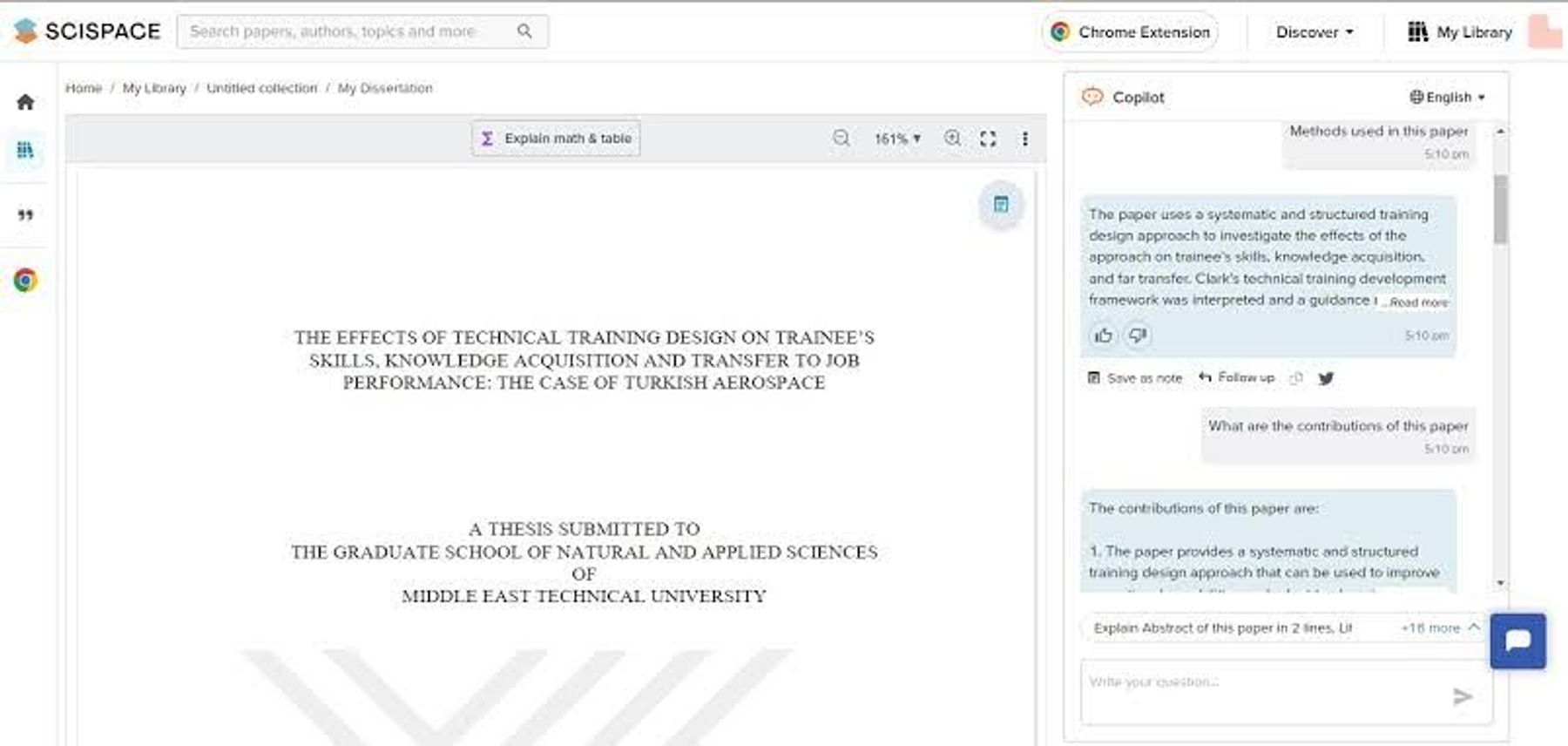
via SciSpace.com
What sets SciSpace apart is its seamless integration with the software you're already using, including reference managers, note-taking apps, and document libraries. Instead of jumping between different platforms to get AI research summary, annotate papers, and organize citations, you can do everything within your existing setup.
The academic focus is also evident; it handles research terminology and complex concepts effectively. The main hurdle is that the free version provides only a limited preview of what’s possible before prompting you to upgrade to a paid subscription, which may not be feasible for everyone’s budget.
SciSpace Copilot best features
- Sync paper summaries and annotations across multiple devices and platforms without manual file transfers
- Collaborate on literature reviews by sharing annotated papers and AI-generated insights with research team members
- Format citations and bibliographies in different academic styles
- Create research timelines that track how papers build on each other within specific research domains
SciSpace Copilot pricing
SciSpace Premium
- Free
- Premium: $20/month
- Advanced: $90/month
- Teams: Starts at $18/month per user
SciSpace Editor
- Free
- Researcher: $20/month per user
- Team: $12/month per user
- Publisher: Custom pricing
- University: Custom pricing
7. Scholarcy
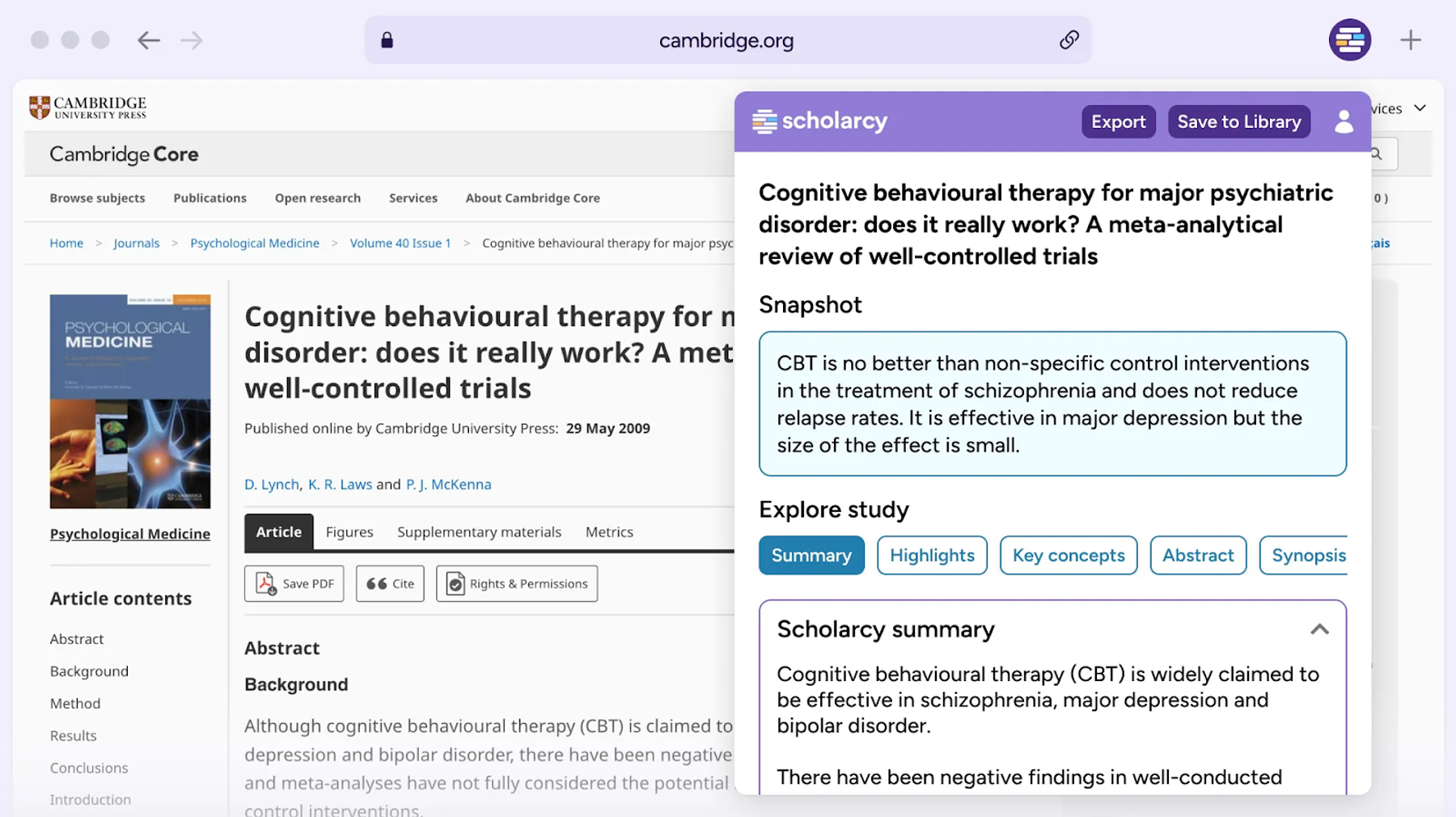
via Scholarcy.com
Scholarcy is purpose-built academic papers summarizer. It automatically recognizes different sections of research papers: introduction, methodology, results, and discussion, and creates summaries that maintain the logical structure of the original work. It also automatically extracts key statistics, figures, and data points, saving you from having to search through tables and graphs.
Where it can trip up is with more complex or nuanced findings. It may sometimes present tentative results as definitive conclusions or overlook important caveats that the authors included. Still, many find this AI research tool for students useful for creating initial overviews of papers before diving into the details.
Scholarcy best features
- Preserve original paper structure while condensing content, making it easier to follow the authors' logical progression
- Extract and organize statistical data, effect sizes, and confidence intervals into easily digestible summary tables
- Identify potential study limitations and methodological concerns that authors mention throughout their papers
- Create comparison charts when analyzing multiple papers on similar topics, highlighting where findings align or diverge
Scholarcy pricing
- Free
- Monthly: $4.99/month
Get summaries you can trust with Anara
Finding the best AI tool to summarize research papers is great, but the real win is getting summaries you can trust.
Most AI paper summarizers get you part of the way there, while Anara takes you the rest of the way with verified insights straight from your sources. Clickable citations back every summary, so you know precisely where each detail came from.
And here’s the best part: you don’t have to pay to see the difference. Anara’s free plan lets you try it out with zero risk. You can start for free, explore how it fits your workflow, and see why AI verified research summaries make all the difference in research.
Ready to make summarizing accurate and straightforward?
Get Anara freeFrequently asked questions
1. Why do AI tools only summarize abstracts instead of full papers?
AI research tools often summarize abstracts instead of full papers due to technical limitations, including context window size, processing costs, and the complexity of analyzing lengthy research documents. Large language models have limits on how much text they can process at one time, so they default to abstracts. Anara addresses this by allowing full-paper analysis, making it a more suitable choice for researchers who require comprehensive summaries.
2. How can I tell if an AI actually read the whole paper?
You can determine if AI has read the entire paper by looking for specific methodology details, source highlighting, and discussion of limitations or future research directions. If a summary only repeats the abstract, the AI didn’t read the full text.
3. Is it cheating to use AI to summarize research papers?
Whether it’s cheating to use AI to summarize research papers depends on how it’s used. Using AI for critical analysis and to understand complex studies is generally acceptable, but copying summaries directly into your work can violate academic integrity policies. The best practice is to treat AI as a study aid, not a replacement for your analysis.
4. What’s wrong with ChatGPT to summarize research and scientific papers?
The primary issues with using ChatGPT to summarize research and scientific papers are context limitations, potential accuracy errors, and the lack of built-in verification. It often can’t process entire papers at once, which leads to incomplete summaries. Anara, on the other hand, is purpose-built for academic research and provides full-paper summaries with references to help you verify accuracy.
5. Are free AI tools reliable for academic work?
Free AI tools for academic work can help with quick summaries, but they usually have quality limits, lack advanced features, and may put your academic integrity at risk. Many only process abstracts, not full texts. Anara offers a free plan to try, and its paid options provide advanced research capabilities like full-paper reading and citation management, which are crucial for reliable academic work.
6. How do I verify that AI-generated summaries are accurate?
To verify AI-generated summaries are accurate, always cross-check with the original source, compare multiple summaries, and use tools with built-in verification features. Several research paper summarizers include citation linking and highlights key details from the methodology and discussion sections, making it easier to confirm that the summary accurately reflects the full paper.
7. What’s the best AI tool for literature reviews?
Anara is the best AI tool for literature reviews, helping researchers save time by summarizing multiple studies, managing references, and structuring insights for comprehensive literature reviews.
8. Can I use AI summaries in my academic papers?
Yes, you can use AI-generated summaries in your academic papers, provided you follow attribution rules and your university’s policies. AI tools like Anara should be used for understanding and organizing research, rather than copying and pasting content into your work. Always write your own interpretation and disclose the use of AI if required by your institution.
